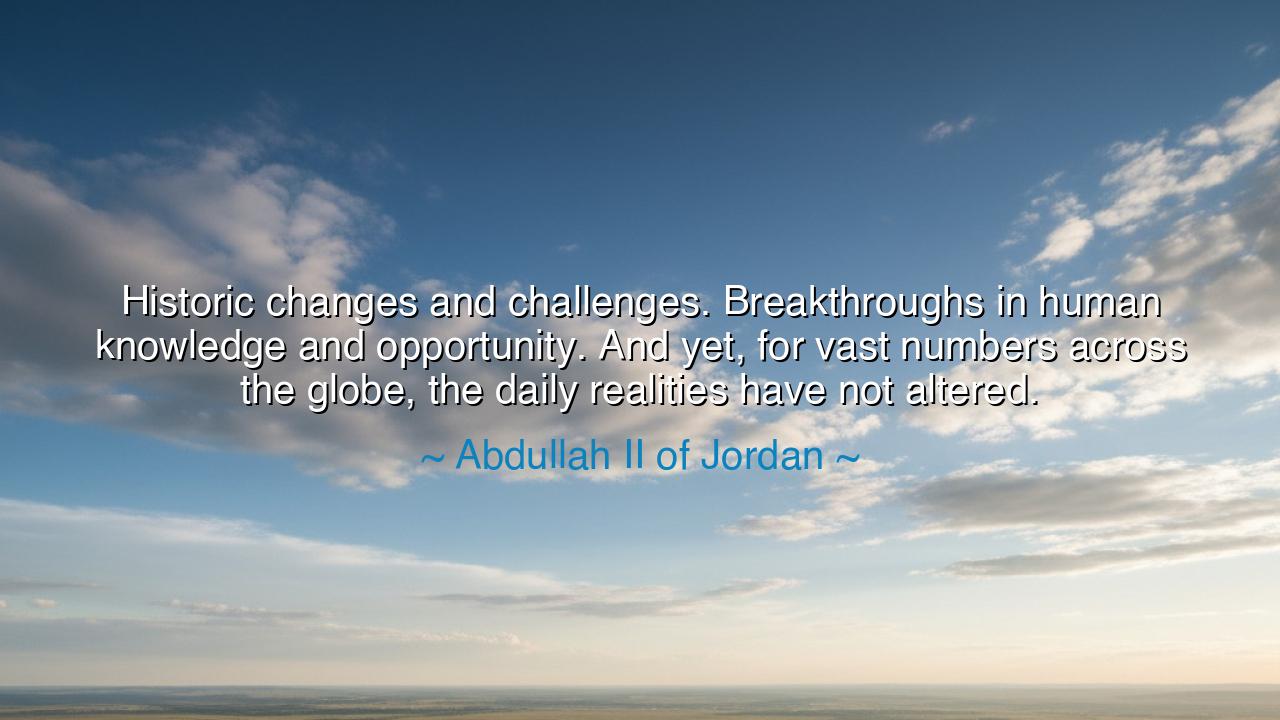
Historic changes and challenges. Breakthroughs in human knowledge
Historic changes and challenges. Breakthroughs in human knowledge and opportunity. And yet, for vast numbers across the globe, the daily realities have not altered.






The words of King Abdullah II of Jordan carry both the weight of history and the ache of compassion: “Historic changes and challenges. Breakthroughs in human knowledge and opportunity. And yet, for vast numbers across the globe, the daily realities have not altered.” In this reflection, the monarch speaks not as a ruler of a single nation, but as a witness to the paradox of the modern age — that in a world of extraordinary progress, countless lives remain untouched by its light. His words are both lament and summons, a call to awaken from the illusion that advancement alone equals justice.
The origin of this truth arises from Abdullah’s lifelong experience as a leader in a region where ancient civilizations and modern struggles coexist side by side. As the world celebrated its achievements — the digital revolution, medical miracles, and the conquest of space — he saw with clear eyes that progress had not yet reached the heart of humanity. Wars continued to uproot families, poverty chained children to despair, and inequality deepened even as the stars were charted. His quote, spoken in global forums, stands as a rebuke to the complacency of the powerful — a reminder that knowledge without compassion and innovation without inclusion are hollow victories.
To say that “the daily realities have not altered” is to expose a deep wound in the fabric of civilization. The modern world measures its greatness by its inventions — its machines, its data, its speed — but King Abdullah reminds us that the truest measure of progress lies in the dignity of the ordinary person. A nation may launch satellites into orbit, yet fail to feed its poor. Humanity may build towers that pierce the clouds, yet ignore those who sleep beneath their shadows. The ancient prophets spoke of this same blindness: a people rich in possessions but impoverished in spirit, praising the works of their hands while neglecting the cries of their brothers.
History offers many mirrors to this truth. Consider the story of Charles Dickens, who in the height of England’s Industrial Revolution, saw cities glowing with new wealth — but also children laboring in factories, families starving in slums, and souls crushed beneath the gears of progress. Through his writing, Dickens revealed the hypocrisy of an age that celebrated prosperity while millions suffered unseen. His work, like King Abdullah’s words, cried out for a deeper revolution — not of machines, but of conscience. Progress, they both teach us, must serve humanity, not overshadow it.
Yet there is hope even within this lament. For to recognize the gap between knowledge and compassion is the first step toward healing it. Abdullah’s vision is not one of despair, but of responsibility. He challenges the generations of today to extend the blessings of progress to all people, not as an act of charity, but as an act of justice. Every scientific discovery, every political reform, every triumph of technology carries within it a sacred duty — to uplift the forgotten, to give voice to the voiceless, and to ensure that no person remains bound to a destiny of despair while others soar.
His words also remind us that change without empathy is fragile. The wise know that the true strength of civilization lies not in its wealth, but in its humanity. When a society leaves behind the weak, it weakens itself; when it blinds itself to suffering, it loses its vision of the divine. For this reason, every individual, not just leaders, must take part in the renewal of the world. The breakthroughs of knowledge must be matched by breakthroughs of the heart — a rebirth of compassion, generosity, and shared purpose.
Let this be the lesson drawn from King Abdullah’s teaching: that no progress is complete until it reaches the hands of the poor, and no society is just until all may walk in its light. Let each person ask, “Whom does my knowledge serve? Whom does my comfort lift?” For if each heart becomes a vessel of empathy, the gap between privilege and pain will begin to close. Let our historic changes not be measured by invention alone, but by transformation — of lives, of spirits, and of the human condition itself.
Thus, as King Abdullah II reminds us, we stand at a crossroads between power and purpose. The tools to heal the world lie in our hands; the question is whether we have the will to use them rightly. May we, the heirs of this age of knowledge, become also the bearers of wisdom — until the phrase “the daily realities have not altered” becomes no longer a truth, but a memory of what humanity once was, before it finally became what it was always meant to be.






AAdministratorAdministrator
Welcome, honored guests. Please leave a comment, we will respond soon